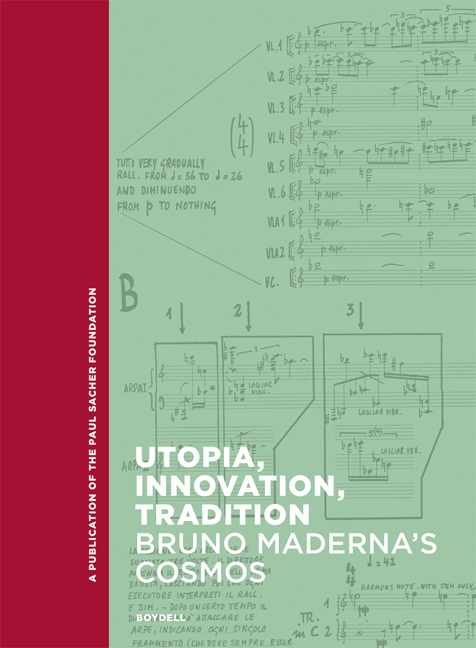Book contents
- Frontmatter
- Contents
- INTRODUCTION
- STAGING AND PERFORMING SOUNDS: A GLANCE THROUGH THE LAST THEATRICAL WORK
- BUILDING SOUNDS: THE COMPOSER
- CREATING SOUND: THE MUSIC BEYOND/WITHOUT THE STAGE
- REINVENTING SOUNDS: DIALOGUES WITH MUSIC OF EVERY EPOCH AND STYLE
- ACROSS BORDERS: THE CONDUCTOR AND THE INTERPRETER
- SEARCHING FOR ROOTS: THE DEVELOPMENT OF A STYLE
- STAGING AND PERFORMING TEXTS: A GLANCE THROUGH EARLY DRAMATURGICAL AND VOCAL WORKS
- Chronology Of Bruno Maderna’s Works
- Selected Bibliography
- Index
“La révolution dans la continuité”: The Presence of the Past in Bruno Maderna’s Creative Process (1948–55)
Published online by Cambridge University Press: 17 January 2024
- Frontmatter
- Contents
- INTRODUCTION
- STAGING AND PERFORMING SOUNDS: A GLANCE THROUGH THE LAST THEATRICAL WORK
- BUILDING SOUNDS: THE COMPOSER
- CREATING SOUND: THE MUSIC BEYOND/WITHOUT THE STAGE
- REINVENTING SOUNDS: DIALOGUES WITH MUSIC OF EVERY EPOCH AND STYLE
- ACROSS BORDERS: THE CONDUCTOR AND THE INTERPRETER
- SEARCHING FOR ROOTS: THE DEVELOPMENT OF A STYLE
- STAGING AND PERFORMING TEXTS: A GLANCE THROUGH EARLY DRAMATURGICAL AND VOCAL WORKS
- Chronology Of Bruno Maderna’s Works
- Selected Bibliography
- Index
Summary
… it is easy to understand that a new mentality and its manifestation in a new technique do not necessarily entail negation of the distant or immediate past. On the contrary, today we are more than ever convinced that natura non facit saltus …
For Bruno Maderna, exploration of new musical territory went hand in hand with a rethinking of the past. For one, he was convinced that, whether or not a composer is willing to acknowledge as much, there is always something of the old that lives on in the new in one form or another. Furthermore, in his own work, Maderna actively drew on practices from the past to invent new compositional strategies. In so doing with seemingly limitless imagination, he pioneered a wide range of compositional procedures that had a profound impact on contemporary music in the 1950s and beyond, with many of his inventions and ideas being taken up by other composers as well who had studied or worked with him. This essay examines a number of Maderna's compositional techniques to illuminate how he took inspiration from music and music theories from the past for his own new compositional techniques. The following examples are taken from works written between 1948 and 1955, during which time he developed his own version of (integral) serialism. My focus will be on Maderna's poetics and its sources of influence. I will not go into the impact of Maderna's techniques on other composers.
Like virtually every Italian composer of his generation – given the kind of training one would receive privately or in conservatories at the time – Maderna began writing in neoclassical styles. Following the works of his early maturity, he started to adopt twelve-tone techniques around 1948 within a musical language that remained largely neoclassical for another number of years, with stylistic influences notably from Bartók, Debussy, Hindemith, G.F. Malipiero, and Stravinsky. During these years, and with every work, Maderna rapidly expanded his compositional means, conceiving new techniques that were as much rooted in compositional principles known from the past as they broke new ground in thinking about musical material, within the aesthetic program of the avant-garde.
- Type
- Chapter
- Information
- Utopia, Innovation, TraditionBruno Maderna's Cosmos, pp. 357 - 380Publisher: Boydell & BrewerPrint publication year: 2023



